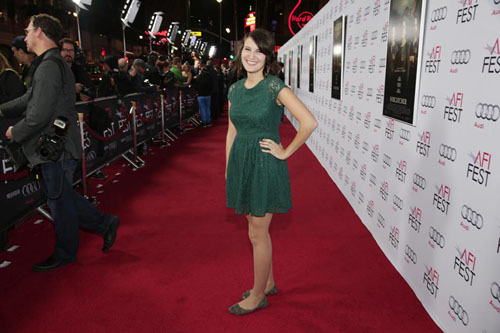
ANA SOUZA – PRODUCER – Blast Beat Movie
.
Film Courage: Where did you grow up? What was life like at home?
Ana Souza: I grew up in Brazil and the Netherlands. I spent my childhood mostly in Brazil and my teenage years in Amsterdam. I loved both, and life at home was pretty great, with very few complaints. I am very lucky to have my parents still be together and to have had the opportunity to travel so much as a result of their careers and their ‘travel bug’, which I have definitely inherited.
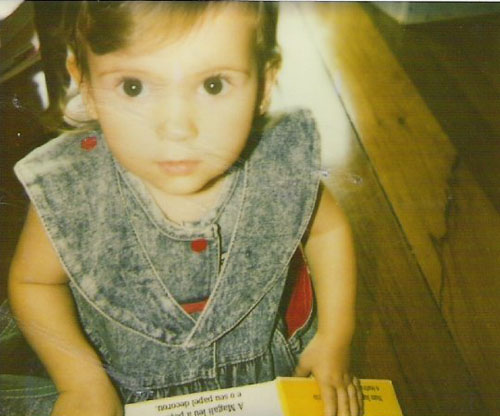
Ana as a young child
“I feel like the world is too large to stay in one place and traveling is still one of my favorite things ever. ‘Global citizen’ and ‘third culture kids’ are terms that tend to refer to specific groups but I hope that in the future it just becomes something everyone can relate to. We are all so much more connected than ever before (especially through the internet and the media) that there is no excuse to stay within your four walls and maintain a narrow mind anymore.”
Ana Souza, Blast Beat Movie
.
.
Film Courage: Which one of your parents do you take after most?
Ana: That’s such a hard question! I definitely have a little of both but I think maybe I take after my dad more…I can be a little impatient about things sometimes the way he is, and he definitely sparked my love for cinema with his own amazing film collection and passion for film. However my mom definitely has a very strong artistic streak and an eye for this that I like to think I’ve also inherited.

Ana and her sister
Ana: Thankfully, my parents have been very supportive and encouraging from the beginning. My sister is also artistic (she is currently studying Fine Arts) but we both branched out as a lot of our family and extended family had studied Psychology and were very much involved with that whole world. My father almost went to film school before deciding on psychology, however, so I have always had his support from the beginning.
Ana: It was very, very difficult, mostly on a cultural level. We moved when I was 11 so I lost a lot of friends in the process and I just had trouble connecting with everyone because I was missing the openness and optimism of Brazil, where it seemed that everyone would go out of their way to help you or make you feel welcome. It was tough to adjust for a while, but eventually I also fell in love with Amsterdam and now it’s one of my favorite places in the world (though I can do without the weather!). I think being in an international school and seeing other people going through the same experience and trouble adjusting really helped me as well.
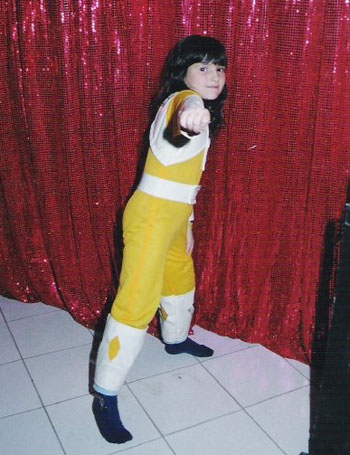
Ana as a child
.Film Courage: What were your plans after high school?
Ana: My plans involved studying film, which luckily I was able to do. I was deciding between the US and the UK and ended up at the University of Warwick in England, where I had an amazing experience. It felt like the natural choice for me to be studying, writing about, and watching films constantly and often it didn’t feel like work or studying at all.
Film Courage: Biggest lesson from attending film school?
Ana: Collaboration. I think filmmakers have a lot of different egos and opinions (myself included of course!) but film school teaches you to keep these at a reasonable level and learn to collaborate with others so that you all bring the best of yourselves to a project and learn to respect each other’s views. Filmmaking is almost impossible solo so building good working relationships and finding people who complement your strengths and weaknesses in the creative process is crucial. Plus, it is so much more satisfying to be working towards something as a group and have it come to fruition!
.jpg)
Ana and her sister
Film Courage: Did you have a teacher who made an impact on your life or views on filmmaking?
Ana: My high school theater teacher has probably had much more of an impact on me than the filmmaking and film studies professors I had after him. Not that they weren’t also important, but I just think immersing myself into his style of theater in high school and learning to push myself beyond what I assumed I could do – that was extremely helpful in setting my goals high and trusting myself that I could achieve them, he really helped me learn to value myself and value my ambition and commit myself to creative ideas I was passionate about.
Film Courage: First movie that made you fall in love with film?
Ana: That’s so hard to say, as I often feel like I was born loving film! But I guess one amazing moment I had was when I saw THE DIVING BELL AND THE BUTTERFLY; that was the first film I saw during my Film Studies program at Warwick, in the very first class. It was shot so beautifully and captured the protagonist’s mindset and perspective so carefully. It really blew my mind and made me realize I had definitely made the right choice to study film.
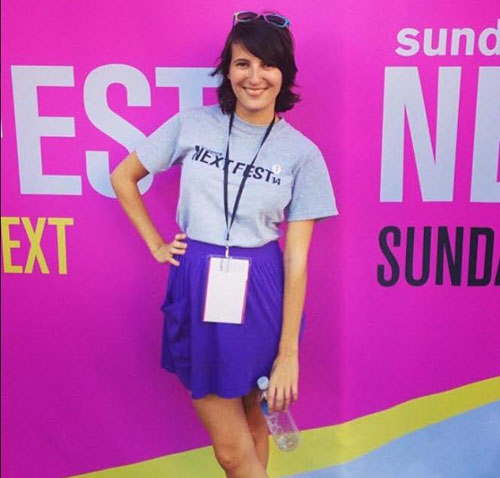 Film Courage: Favorite metal song and why?
Film Courage: Favorite metal song and why?Ana: Deftones are my main foray into Metal (Be Quiet and Drive is probably my favorite song of theirs), although I have to admit I’m less of a metalhead than my fellow producers 🙂 I was more of an indie and classic rock kind of gal. I do love me some AC/DC.
.
Film Courage: First band you saw perform live?
Ana: I saw Santana very early on and having grown up listening to his music it was a revelatory concert! I’ve never seen anybody play like him and have such a command of guitars. It was a great first taste that left me wanting more!
Film Courage: How do you think living in Brazil, Amsterdam, England and Los Angeles has shaped who you are/your world view?
Ana: It’s expanded how I see the world and how I see virtually everyone I meet. It reminds me that differences between people are not good or bad, they are just differences, and this helps me keep me a clear head. I feel like the world is too large to stay in one place and traveling is still one of my favorite things ever. ‘Global citizen’ and ‘third culture kids’ are terms that tend to refer to specific groups but I hope that in the future it just becomes something everyone can relate to. We are all so much more connected than ever before (especially through the internet and the media) that there is no excuse to stay within your four walls and maintain a narrow mind anymore.
Film Courage: From the Director’s Vision on the BLAST BEAT Kickstarter page, it talks about possibly taking two years to “fit in” upon leaving one’s homeland for the U.S. How long did it take you to feel like fitting in amongst all your travels? Which country made you feel most welcome?
Ana: I think it was like a muscle, the more I worked at it, the easier it got. Moving to the Netherlands was difficult and it took me about a year (roughly) to adjust, I’d say. But once I had that under my belt and moved to England, it became easier. Starting from scratch is always scary but it’s also thrilling and opens up a whole new avenue of possibilities and new people. I think the US has been of the countries to make me feel most welcome, as everyone has been very friendly and I’ve found it easy to connect with people in Los Angeles as so many people have creativity in common and a mutual passion for film. It’s exciting to be in a place where so many people are working towards keeping independent film alive and thriving.

Film Courage: First touristy thing you did once arriving in L.A. and first celebrity you saw in person?
Ana: First touristy thing would be the walk of fame (had to be done!); Hollywood was a lot stranger than I expected, haha. I’ve seen a number of celebrities working for festivals but the first one that really had an impact on me was having David Lynch say ‘hi’ to me as I was ticket-taking during my first year volunteering for AFI FEST. It’s mostly normalized for me now but every now and then something like that will sneak up on you and leave you a little star-struck.
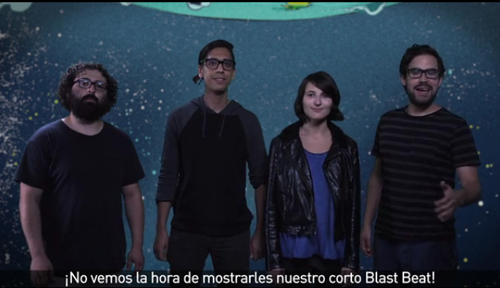
Film Courage: What is the film BLAST BEAT about?
Ana: Blast Beat is a coming-of-age film set in the year 2000 about a pair of brothers who are undocumented Colombian immigrants living in the US suburbs during their teenage years. For me, it’s a story that really speaks to the angst and struggle of not fitting in and trying to find your identity both as a teenager and as someone bicultural thrust into a new environment and a new culture at such a crucial and difficult time. It’s about trying to find your place in a world that is shifting and trying to navigate the different unjust boundaries that exist between citizens and immigrants. It’s about the need for an authentic Latino experience onscreen in a new Hollywood style, so that we can bridge the gap and have these voices heard.
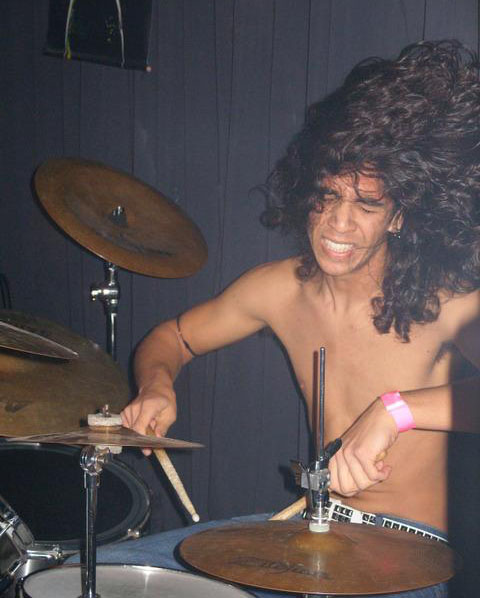
Erick Castrillon
Ana: Erick (our writer-producer) and Esteban (our director-writer) came up with the idea together, based on their own experiences immigrating to Florida from Colombia as teenagers. When they approached me with the script I connected to the material immediately as a fellow third culture kid that also went through a difficult transition that was magnified by being in my teenage years. I’ve also had trouble navigating where exactly I fit into in terms of citizenship and the script also addresses this with a lot of heart.
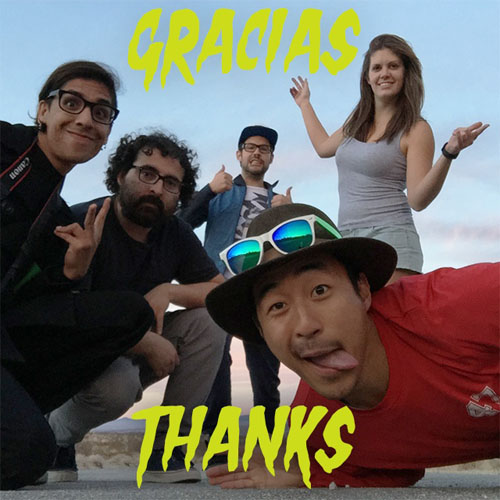
.
Film Courage: How much time did you spend from idea to execution before launching the Kickstarter?
Ana: It’s been in the making for a very long time, long before I even came onboard. I was brought on late last year and then we began strategizing about the festival circuit plans and the fundraising plans for the campaign. There were at least three months of preplanning for the campaign that I was directly involved in, though the preplanning had started even before that. We wanted to make sure we were ready and had enough content generated and social media buzz before launching.
“Every metalhead out there knows that a blast beat is the apex in a metal song that unleashes an assault of raw energy. This is a direct analogy of the events in Carly’s life that force him to take a bold leap into adulthood, a decision that will change him forever.”
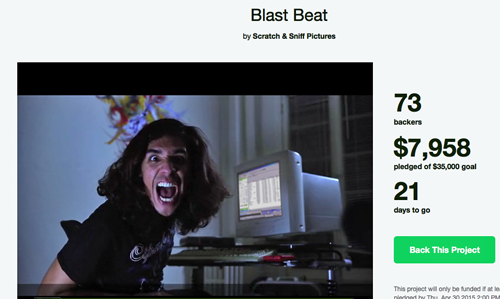
.
.Film Courage: Our understanding is that it’s not easy becoming a Kickstarter Staff pick? How did this happen? Advice to others who may also want to be a staff pick?
Ana: We had some contact with Kickstarter but we were also told that it depended on how much we were able to fundraise during the first week, so we made sure to set our goals high and get a lot of contributions in early so that we could have a strong initial impact and hopefully keep that momentum going for the rest of the campaign. I think our materials also helped in that our layout was carefully designed and our video underwent many drafts and changes before we launched so that we made sure we had the best presentation possible for our idea.
Film Courage: Why is BLAST BEAT using humor to shed light on a serious issue?
Ana: I think the issue speaks for itself in its seriousness, so our humor is a way of turning the system on itself. The whole legal terminology of calling immigrants ‘aliens’ is pretty absurd and dehumanizing (and speaks to the way immigrants are often treated), so our promos have transformed this metaphor into reality to poke fun at the whole notion and make people realize that it’s ridiculous. I think humor often makes darker material accessible and helps people easily understand what’s at stake.
Film Courage: Is the script finished?
Ana: Yes, we have gone through many drafts and the script is currently finished.
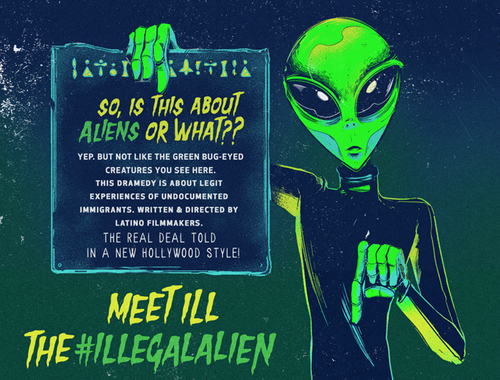
Film Courage: Have you witnessed undocumented peoples’ struggles, fears firsthand?
Ana: I have and I think a lot of people have, whether they acknowledge it or not, and it’s problematic that it has become such a taboo issue to talk about. I think Obama has done a lot thankfully but we still have a very long way to go for immigration reform and for things to really change, and the main problem is the way undocumented people are widely perceived, which is definitely one of the key things BLAST BEAT is aiming to alter. The Netherlands is actually a great example, as there are clinics where undocumented migrants can seek free healthcare. They privilege quality of life and human rights over the politics and red tape that often bog down similar needs in other countries. It’s adjusting this mentality that is the first step, and part of the reason I think film remains such a powerful medium is that is often able to trigger reflections, raise awareness, and instigate action.
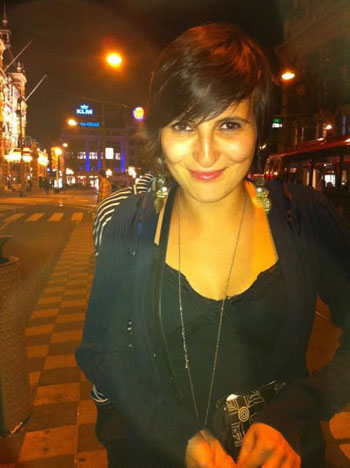
Film Courage: How has your film festival experienced shaped your work as a producer on BLAST BEAT?
Ana: It’s helped me enormously as I feel that it’s informed my vision of BLAST BEAT’s future from the beginning. I think not enough filmmakers budget and think about the film festival circuit beforehand (it’s often a vague, looming thing first addressed in post-production), and I think it’s crucial to have this be a part of the film from the start. Knowing who your audience is and knowing where the film has a high chance of doing well is so important as it informs the whole production process as well. I think working in festivals has helped me keep this in mind from the very start and have a clear idea of who we want to address and how the film can reach audiences once it is completed.
Film Courage: What advice can you give to filmmakers on preparing for their festival screening once being accepted?
Ana: Keeping contact with the festival is crucial, as they often require a lot of information and you need to be cognizant of that. Many festivals organize incredible events for filmmakers and networking opportunities that I think are crucial to attend to really expand your reach and get to know fellow filmmakers and festival staff; on that note getting to know the programmers is also essential and a very helpful resource once you have future projects that you might be submitting to the very same festival. Also, though it’s not usually a concern for shorts, I think for features it helps a lot to save part of your budget to hire a decent publicist during the festival. With so many films screening next to each other you don’t want to get lost in the middle of it all and a publicist can help you ensure the word gets out and that you get the right audiences and industry (particularly distribution) to your screening. On this note, sales agents can also be very useful, though it really depends on what your film’s needs are and how much you are able to spare. The bottom line is that festivals are just the beginning, and filmmakers need to be thinking ahead to where their film is going afterwards.
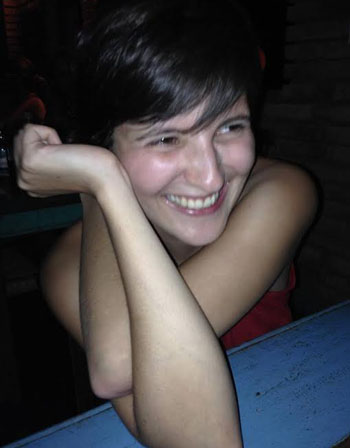
Film Courage: What’s your favorite film about outdoor adventures (since your bio mentions you love hiking and nature)?
Ana: I really like INTO THE WILD, and I also saw WILD recently which had mixed reviews but I had a positive reaction to it as I think it did a great job of capturing a female-driven perspective within that framework of a past-time that is often seen as male-dominated. The settings were also beautiful and the whole film really tempted me to quit everything and just go hiking for six months!
Film Courage: Topic for your M.F.A. thesis? Would you keep it the same if you had to do over?
Ana: The USC Critical Studies MA does exams rather than a thesis; however I did do a dissertation in England on Jean-Pierre Jeunet’s films and whether he can be considered an auteur. I loved writing it as he is one of my favorite directors and I consider him one of the most influential directors working today in terms of his aesthetics and talent for storytelling in particular.
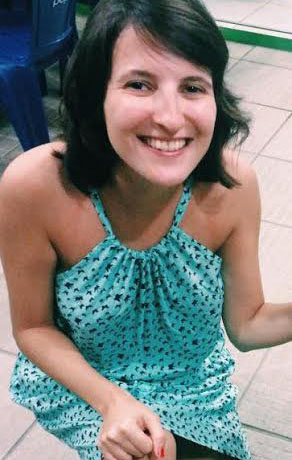
Film Courage: Creative plans/possibilities after BLAST BEAT?
Ana: Scratch and Sniff Pictures has other projects in development, particularly a feature called OF STARS AND ALLIGATORS that we are all very excited about. I am hoping that being successful with BLAST BEAT would propel us in the right direction for launching future projects and give us a strong foundation from which to grow.
BIO:
Ana was born in São Paulo, Brazil and moved to Amsterdam at the tender age of 11, where she had trouble navigating the high-speed bike paths at first. She quickly adapted, however, and found herself a lover of all things film-related when she hopped over the channel to England for her BA in Film Studies at the University of Warwick.
Not content with one degree and exasperated with the rain, she moved to Los Angeles to pursue an MA at the University of Southern California, where she graduated in 2014 after producing a number of short films and even more Critical Studies essays.
She has since become obsessed with film festivals, undertaking work for Outfest, AFI FEST, Slamdance, the Los Angeles Film Festival, No Budget Film Festival, NEXT Fest, Cannes, Sundance, the Indian Film Festival of Los Angeles, and Ambulante California. She’s also kept up her writing through publications like Indiewire, We Eat Films, The Artifice, and Front Row Reviews. She will happily argue with you about the brilliance of Spring Breakers or who can do the best Werner Herzog impression.
Ana likes making up for the time spent watching movies with being outdoors. She has a national park pass this year so her goal is to hit up amazing landscapes for as long as she can withstand the lack of cell phone signal. That is, when she’s not busy rallying for indie films and her latest project in particular, Blast Beat.
.
.
.
.
ABOUT BLAST BEAT:
Blast Beat is a coming-of-age drama with some comedy thrown in the mix set in the year 2000 about CARLY and MATEO. Carly is a tougher-than-nails 17-year-old dude who’s passionate about metal music; it’s his escape, his ritual, and his definition. His 15-year-old rival brother, Mateo, is more of a free spirited, sensitive, and artistic soul.
The brothers’ family are Colombian undocumented immigrants that have been living in the U.S. for only a year and are in the middle of a difficult and painful cultural transition. Nelly, The boys’ mother, is having an affair with a man they know from church, and what’s even worse their role-model father, Ernesto, has been suddenly picked up by the Immigration Police and is getting deported!
When the news of the deportation comes to light, Mateo tries to carry out a crazy plan that would reunite him with his father. But even though the brothers are ultimate rivals, Carly sets out to protect Mateo from his own madness and save the future of the family.
























